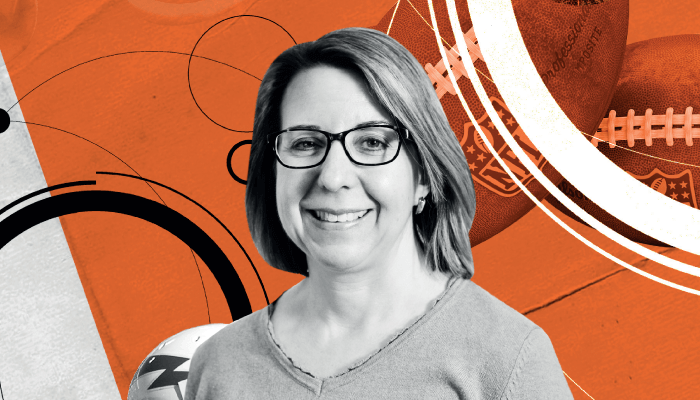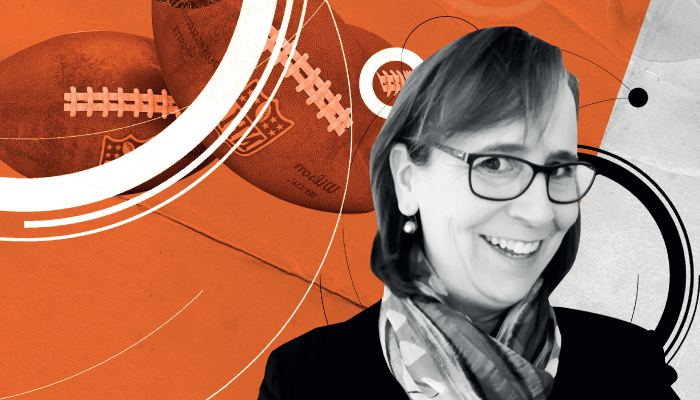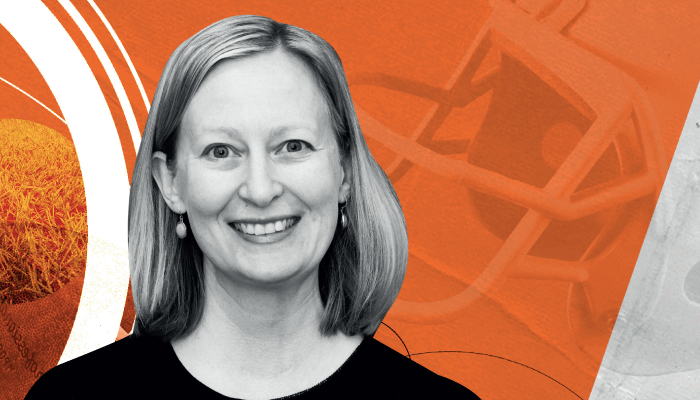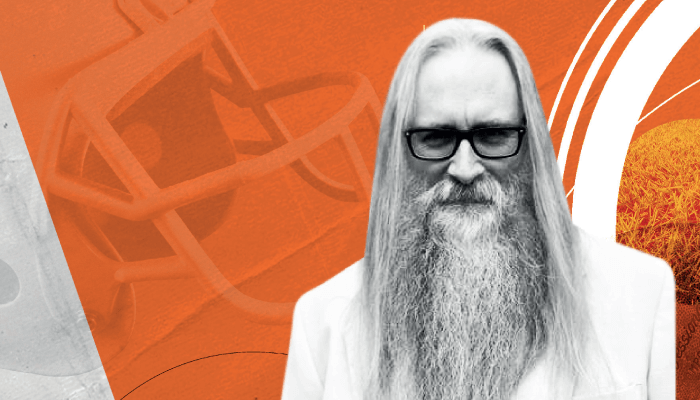SciX, like many conferences, is trading its conference venue for chatrooms and virtual whiteboards in 2020. We caught up with five key members of the team – Mary Kate Donais, Linda Kidder Yarlott, Karen Esmonde White, Ian Lewis, and Becky Dittmar – to consider what SciX means to the analytical chemistry and spectroscopy community. Get ready to explore the past, (virtual) present, and (currently uncertain) future of this key event in the analytical calendar.
Mary Kate Donais
“My analytical chemistry career has seen me work across federal government, industrial, and academic settings. Now, as a professor at the Department of Chemistry of Saint Anselm College in Manchester, New Hampshire (a small, liberal arts college), I aim to broaden students’ understandings of spectroscopy and wider (analytical) chemistry while exploring the application of these approaches to studying art and archaeological goods. I appreciate all the people I have the privilege to work with in my role as SciX Program Chair for 2020."

Linda Kidder Yarlott
"My professional passion is to match customer needs with analytical tools; as the Life Science Business Development Manager for Horiba, this is exactly what I do. SciX is the perfect venue to explore this intersection, and my decades-long affiliation with the conference has paved the way to a fulfilling career. I was first asked to organize a Raman session for FACSS as a postdoc. A word of warning: be careful what you agree to, as that one small role expanded over the years, leading to my involvement in the governance of several Federation Societies (SAS and Coblentz) and organizing the Molecular Spectroscopy program for seven years. In 2020, I’m proud to act as the General Chair of SciX, working alongside a great committee to deliver quality content to our attendees around the world.”

Karen Esmonde-White
“I am the current Marketing Chair of FACSS and SciX, which means that I am part of the FACSS executive committee and a co-chair of the biomedicine section of the SciX meeting. My career at SciX began in 2010, when I organized a new session in drop deposition. I’ve been organizing sessions in the biomedical, Raman, and 'Contemporary issues in analytical science' sections ever since! I’ve also taken on more responsibilities. I served as chair of the biomedical section since 2014, but took a break from the in 2018 to serve as the program chair. Outside of FACSS and SciX, I am a product manager at Kaiser Optical Systems, Inc., lead a Girl Scout Brownie troop, yearn to thru-hike the Pacific Crest Trail, and grow preternaturally delicious vegetables.”

Ian Lewis
“I am the current FACSS Treasurer (on the FACSS executive committee), and I also act as a co-chair of the Raman section of the SciX meeting. My first organizational involvement with FACSS was as a session chair in 1994, and I also served as the conference program chair in 2007 and Governing Board Chair in 2012 and 2013. Outside FACSS, I am the Director of Marketing at Kaiser Optical Systems – an Endress+Hauser company. My role with Kaiser focuses on translating and delivering the potential of Raman spectroscopy into industry settings.”

Becky Dittmar
"After being awarded a FACSS student award while in grad school, I soon became an active participant in SAS, the Coblentz Society, and FACSS/SciX, holding numerous voting-level positions in each organization. I joined 3M after graduate school as a spectroscopist in the corporate analytical lab, and after 10 years of lab work, I broadened out into management, Six Sigma, product development, and manufacturing quality over my 27-year career. I believe that a good analytical lab can make a huge impact on quality; a combination of good people, good equipment and – often – good luck is key to succeeding in this field.”

Karen-Esmonde White "The Federation of Analytical Chemistry and Spectroscopy Societies (FACSS) has been bringing together its member societies for an annual conference called SciX since 1974. The conference attracts approximately 1,000 scientists from around the world and is respected for its exceptional spectroscopy program, featuring over 35 sessions in fundamental research and industrial applications for molecular and atomic spectroscopy. Growth of the applied science program and expansion into the separation sciences in particular have allowed the conference to expand since it became SciX in 2012. As an example, I’m very pleased to have witnessed the biomedical, data sciences, process analysis, and pharmaceutical offerings more than double in the past 10 years!"
"We are also pleased that member societies make SciX the home of their annual meeting, including the Coblentz Society, the Society for Applied Spectroscopy, and the North American Society for Laser-Induced Breakdown Spectroscopy. And, in 2018, the AES Electrophoresis Society made SciX their annual meeting home, too. This new addition complements our strong spectroscopy program and brings cutting-edge research in separation sciences to SciX."
Becky Ditmarr "I think Karen covered most things! But I’ll add that the aim of FACSS is to bring scientific organizations together for scientific exchange, and the aim of SciX conference is to provide a venue to allow that to happen on a personal level. An important element of SciX is that the program is put together by scientists with a variety of backgrounds and interests. Applied science is provided with just as prominent a position in the program as fundamental research, and scientists – whether in leading roles in academia, government laboratories, or industrial positions – are all featured and heard."
Ian Lewis "I’ll take this one! FACSS, like many analytical chemistry and spectroscopy meetings, found itself shrinking in terms of attendees, exhibitors, and total number of presentations in the early 2000s. Understanding this, FACSS held a set of strategic retreats that culminated in rebranding the annual North American meeting as the SciX conference. This led to seven new member organizations joining FACSS. Three of these organizations are based outside North America, helping to increase the visibility of SciX internationally and expanding the international diversity of attendees. Though the location of the SciX meeting does affect the attendance, attendance, exhibitor numbers and presentations are consistently above the numbers we saw back in 2006."
Ian Lewis "There are four areas showing significant growth in Raman right now: (1) use of surface-enhanced Raman spectroscopy (SERS); (2) nanoRaman and imaging; (3) biomedical applications; and (4) process implementations for monitoring and control. The first two are driven largely by university research, while the latter are more driven by industry."
Linda Kidder Yarlott "Simplified systems that allow non-experts to get actionable data. AI may constitute one aspect of this, but it encompasses much more than that in terms of industrial application and the interface designs needed to facilitate its use. If instrument designers can provide actionable information while minimizing mistakes in acquiring and interpreting data, then we could open the door to fresh opportunities in less-developed markets, or even for mass-consumer markets (like the FitBit, for example)."
Karen Esmonde-White "I have a background in pharmaceuticals, process analysis, and clinical translation. And I’d say these past 10 years have brought many new uses of analytical chemistry in the fields of medicines, biological tissues/fluids, agriculture, and advanced materials. Ten years ago, I never would have guessed that I would be carting a Raman instrument into a dental office for clinical research! In these fields, it’s rewarding to see spectroscopy being recognized as a valuable technology. The fun, and the challenge, for us in the field is to harness that level of chemical knowledge in a meaningful way for non-specialists, so that they can continue to help us bring the technology to new places."
Mary Kate Donais "Portable instrumentation! These instruments are facilitating research that was not previously possible. The object of interest no longer needs to be moved to a lab or destructively sampled. The instrument can instead be transported directly to the object of study. In the field of cultural heritage research, portable instruments are making a real difference, and more and more applications are emerging for portable X-ray fluorescence, Raman, laser-induced breakdown spectroscopy, and various other techniques!"
Becky Dittmar "As I’ve moved further away from direct science, I don’t have much to add here, but improved testing for food safety and the understanding of viruses (topical) are areas that require a broader scope. Another current concern is the effect of social media and politics on science. How can (or should) scientists help drive a more rational approach? We typically work behind the scenes, but we need to be visible and valuable enough to provide legitimate direction and engage kids in STEM – all while doing our day job."

Linda Kidder Yarlott "This decision was extraordinarily difficult to make. We were guided by feedback from our attendees, as we sent several surveys out to gauge interest. A common thread in the responses was the importance of maintaining contact with the SciX community. We also heard loud and clear that the content needed to be tailored to the virtual environment – so that’s what we did! Our program plan (both scientific and networking) reflects this goal."
Ian Lewis "The decision to offer a virtual format in 2020 is based on the desire to reach scientists who might never be able to attend an international meeting, or who can only rarely attend. These scientists have, historically, been unable to benefit from the talks at SciX or the networking opportunities. The virtual format offers these possibilities to all who register!"
"Coronavirus is another obvious factor in the decision, and the ensuing lockdown has given people an opportunity to re-evaluate projects; current, future, and shelved. Working, for the most part, with industry, I believe industry-based researchers have been less affected than university research teams. One trend I’m seeing is that people are searching further for concise virtual training and information exchange opportunities."
Karen Esmonde-White "As Ian says, the goal for the virtual meeting is to bring SciX to those who couldn’t normally attend – and to help attendees fully experience the breadth and depth of the scientific program. I enjoy attending new sessions at SciX to learn about different fields, and I know that other attendees do also! The 'complaint' I often hear at SciX is that there are so many good talks and it’s impossible to attend every talk. With a virtual program, including recorded talks available after the virtual meeting, attendees can now live without fear of missing anything important."
Becky Dittmar "Going virtual this fall is obviously necessary in the pandemic environment – but it will be a huge challenge to enable the networking that is so critical to our success at physical meetings. Setting up 'forced networking' remote meetings (brown bag lunches, remote happy hours, and such like) around topics of general (faster testing for viruses) and more specific (career opportunity discussions for students) interests might help in the virtual adjustment. This year’s program will be particularly tailored with these considerations in mind."
Mary Kate Donais "For me, SciX is the perfect blend of quality science and strong networking opportunities. Every year affords the opportunity to learn a great deal, meet new people, and catch up with friends in the field. The conference also brings together a number of key professional organization for me – SAS, RSC, ACS, Society for Archaeological Sciences – so I can meet up with society leaders to discuss recent activities and member opportunities."
"My early years attending SciX truly shaped my career. Attending SciX gave me and (later) my students an opportunity to present research, while also helping to strengthen my involvement with the Society for Applied Spectroscopy. Those roles led me to roles on the SciX leadership team. And, throughout, my circle of colleagues and friends has grown, leading to new professional opportunities and collaborations."
Becky Dittmar "International SciX venues are a great growth opportunity in locations that don’t already have an analytical chemistry support structure or conference. They enable scientists who are unable to travel (students and industrial scientists, for example) to get exposed to the network and technical advancements in a casual environment. Again, the focus is on the ability to network – everyone in attendance is your peer."
"With the growth of supporting organizations, SciX can also help you learn about areas outside your expertise. A successful scientist cannot focus on one 'method' and expect to grow and succeed. I moved away from spectroscopy some time ago, but I’m able to maintain a connection to my spectroscopy network and (when time allowed) learn about advancements that could be relevant in my industrial career by volunteering at the conference."
Karen Esmonde-White "SciX is a great meeting because of its emphasis on scientific excellence and community. What is unique to SciX is the passion and dedication of the volunteer organizers, who bring a blend of world-class science and networking to all our attendees. In 2020, it is more important than ever to exchange ideas and forge new paths to address challenges. It is also important to feel grounded within the community. On this topic, one of the primary goals of SciX is to tie everything together for attendees, from the latest research and technology to making new connections and strengthening old friendships."
"And, as a final note, I think one of the things that makes SciX so special is the fact it is volunteer-driven and community-focused. I think that many people respond positively to being part of a community where they feel welcome and where they know they can have a positive impact. As a result, SciX continues to grow, evolve, and thrive! The next generation of scientists bring new ideas to the program, new volunteers bring passion and new technologies to build community, vendors showcase their latest technologies, and our attendees are active in helping to shape the long-term vision of the federation and the conference."
Linda Kidder Yarlott "I agree with all of the above! Also, SciX has a great strategy to bring in thought leaders and industry luminaries. Innovation awards, plenaries and keynotes that highlight impactful and innovative science (and a tremendous expansion of the exhibits) all interact to keep the level of scientific engagement at a very high level. SciX is where I come to engage with the thought leaders in analytical instrumentation. The emphasis on networking and collegiality means that I can approach the luminaries and ask questions. This was the case when I was starting out, and is still true today."
Mary Kate Donais "We are recognizing more and more the need to communicate with our worldwide audience through multiple channels. Not only do we strive to produce quality in-person conferences, but we also use social media and other platforms to bring together scientific minds. For example, we are providing some pre-SciX webinars this year; these will help spread the word regarding SciX 2020 while delivering quality scientific content in a fresh format. As for the future, I can only imagine that we will make increasing use of such tools to expand our reach even further!"




